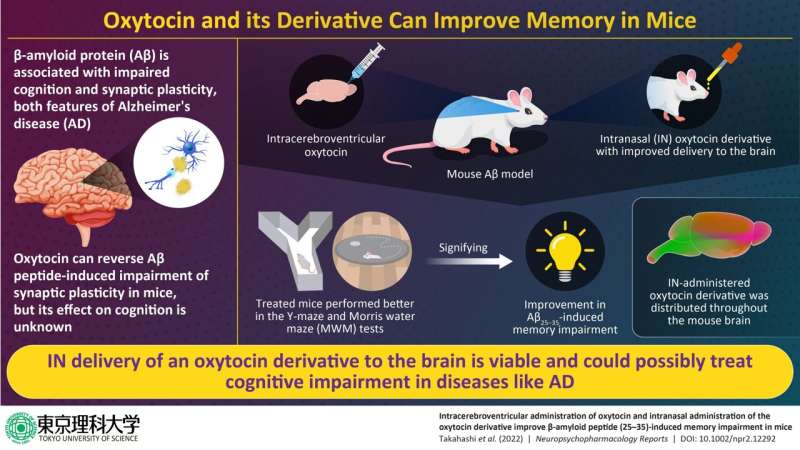Novel derivative of 'love hormone' oxytocin may reduce cognitive impairment in Alzheimer's

The cognitive decline and memory loss observed in Alzheimer's disease (AD) is attributed to the accumulation of β-amyloid protein (Aβ), which impairs neural function in the brain. Experimentation has shown that oxytocin, a peptide hormone primarily responsible for parturition, bonding, and lactation, also regulates cognitive behavior in the rodent central nervous system (CNS). This finding, along with the identification of oxytocin receptors in CNS neurons, has spurred interest in the potential role of oxytocin in reversing memory loss tied to cognitive disorders like AD.
However, peptides like oxytocin are characterized by weak blood-brain barrier permeability, and so can only by efficiently delivered to the brain via intracerebroventricular (ICV) administration. ICV, however, is an invasive technique which is impractical to implement clinically.
Delivering peptides to the CNS via intranasal (IN) administration is a viable clinical option. Prof. Chikamasa Yamashita at Tokyo University of Science recently patented a method to increase the efficiency of peptide delivery to the brain, by introducing cell-penetrating peptides (CPPs) and a penetration accelerating sequence (PAS) through structural modifications. Previous work had confirmed that both CPPs and the PAS benefit the nose-to-brain delivery pathway. Now, a group of researchers, led by Prof. Akiyoshi Saitoh and Prof. Jun-Ichiro Oka, leveraged this approach to prepare an oxytocin derivative: PAS-CPPs-oxytocin. Their findings were published online in Neuropsychopharmacology Reports.
"We have previously shown that oxytocin reverses amyloid ? peptide (25-35) (A?25-35)-induced impairment of synaptic plasticity in rodents. We wanted to see if PAS-CPPs-oxytocin could be delivered more efficiently to the mouse brain for clinical application, and if it improved cognitive functional behavior in mice," states Prof. Oka.
The group first developed an A?25-35 peptide-induced amnesia model by supplying A?25-35 to the mouse brain using ICV delivery. During the course of the study, the spatial working and spatial reference memories of these mice were evaluated using the Y-maze and Morris water maze (MWM) tests.
After confirming that memory was affected in A?25-35-impaired mice, PAS-CPPs-oxytocin and native oxytocin were administered using the IN and ICV routes respectively, to see if learning and memory improved in the treated mice. Finally, the distribution of the IN-administered oxytocin derivative in brain tissue was profiled by imaging of a fluorescent-tagged oxytocin derivative.
The results of this study were quite promising. The tagged PAS-CPPs-oxytocin showed distribution throughout the mouse brain following its IN administration. While the ICV administration of native oxytocin improved test outcomes in both the Y-maze and MWM tests, the IN administered PAS-CPPs-oxytocin yielded memory improving effects in the Y-maze test. Hailing the team's discovery, Prof. Oka says, "my team is the first to show that the oxytocin derivative can improve the A?25-35-induced memory impairment in mice. This suggests that oxytocin may help reduce the cognitive decline we see in Alzheimer's disease."
Why are these findings clinically useful? Prof. Oka explains the broader implications of their work. "The oxytocin derivative enters the brain more efficiently. Furthermore, since IN delivery is a non-invasive procedure, this modified version of the hormone could potentially be a clinically viable treatment for Alzheimer's disease."
More information: Junpei Takahashi et al, Intracerebroventricular administration of oxytocin and intranasal administration of the oxytocin derivative improve β‐amyloid peptide (25–35)‐induced memory impairment in mice, Neuropsychopharmacology Reports (2022). DOI: 10.1002/npr2.12292




















